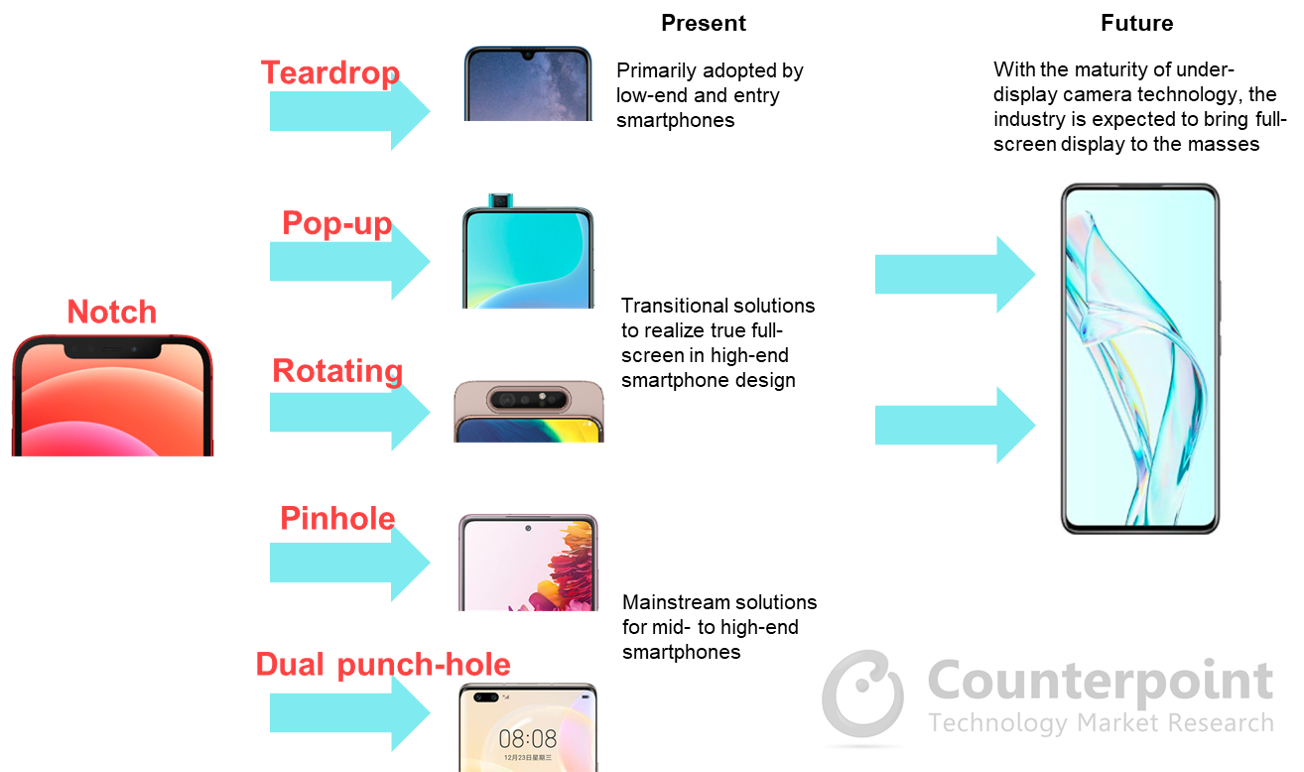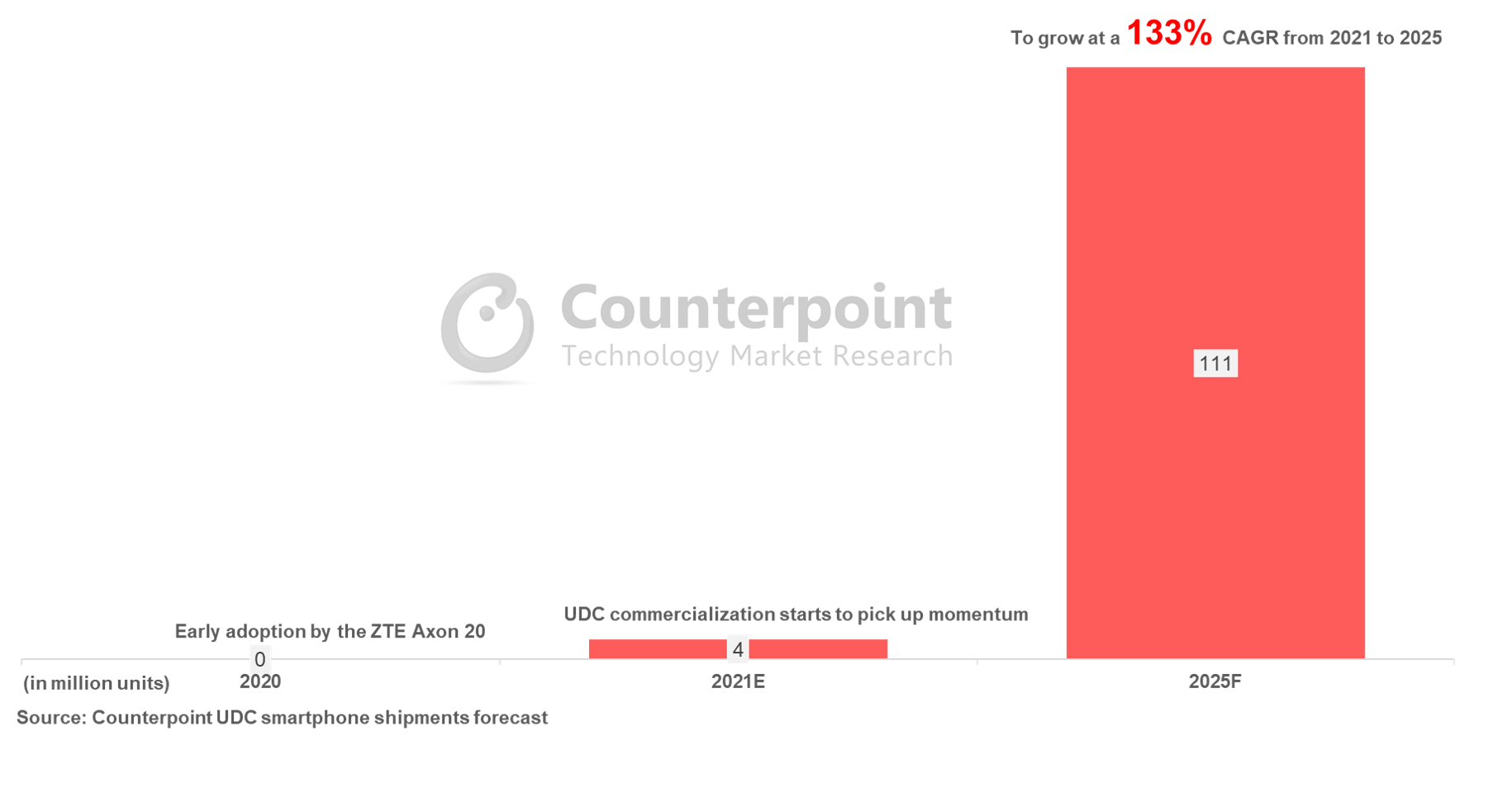Beijing, Boston, Toronto, London, New Delhi, Hong Kong, Taipei, Seoul – July 30, 2021
- Under-display camera technology is at the core of the pursuit of a true full-screen display.
- The shipments of smartphones featuring under-display cameras will reach around 15 million and 110 million in 2022 and 2025, respectively.
Smartphone makers have introduced a variety of screen innovations since the implementation of notch design in the iPhone X in 2017. The aim is to increase the screen-to-body ratio and enable a more immersive display experience. With the pursuit of full-screen display being at the core of smartphone evolution, this trend is expected to pick up pace in the near term.
Under-display Camera Recipe for Full-screen Display

Although the front camera system with pop-up, rotating or sliding mechanics had emerged as a compromise solution to remove the cut-out, it is the under-display camera technology that represents the development direction of future full-screen display.
Commenting on the commercialization of under-display cameras, Research Analyst Alicia Gong said, “Together with Visionox, ZTE has released its second-generation under-display camera solution for the Axon 30 5G, which is expected to deliver more consistent display performance through algorithm and hardware optimization (the resolution of display area above the camera has doubled from 200ppi to 400ppi). Besides Visionox, solutions from other leading panel makers like Samsung Display, BOE and CSOT are close to commercialization. CSOT can also hide the front camera under an LCD screen. Therefore, a solid foundation is being laid for the increasing adoption of such solutions by smartphone OEMs like Xiaomi, Samsung and OPPO.”
However, large-scale commercialization of under-display cameras still faces challenges, which make its mass-market penetration difficult before 2023:
- Increase in display panel cost due to new materials and additional process steps.
- Lower yield rate during the ramping-up period and supply capacity constraints before 2023.
- Deterioration of image and display quality, particularly the loss of image clarity.
- Differences between under-display camera solutions demand OEMs collaborate with an exclusive display vendor.
Despite the abovementioned barriers, we expect the entry of major OEMs to accelerate performance improvement of the technology and make it mature. Growing investments from all industry stakeholders, right from panel makers to image sensor and chipset vendors, hold the key here. The migration to full-screen display will not only enhance smartphone appearance and experience but also bring new opportunities for the supply chain.
According to Counterpoint’s Smartphone Camera research, the shipments of smartphones featuring under-display cameras will surpass the 10 million and 100 million milestones in 2022 and 2025, respectively.
Under-display Camera Smartphone Shipments, 2021 vs. 2025

In terms of smartphone brands, the upcoming MIX4 marks Xiaomi’s entry into the under-display camera segment. The brand is aiming to expand its presence in the segment and likely spread the technology to more premium models during the forecast period. Samsung, leveraging its in-house capabilities, is expected to lead the deployment of under-display cameras in smartphones, and gradually apply the design across its Galaxy Fold and S series. Besides, OPPO and HONOR may also embrace the technology next year. For Apple, the implementation of under-display cameras is likely to start in 2024, when the technology becomes mature with little loss of display and image quality.
Background:
Counterpoint Technology Market Research is a global research firm specializing in products in the TMT (technology, media and telecom) industry. It services major technology and financial firms with a mix of monthly reports, customized projects and detailed analyses of the mobile and technology markets. Its key analysts are seasoned experts in the high-tech industry.
Analyst Contacts:
Follow Counterpoint Research
press(at)counterpointresearch.com

